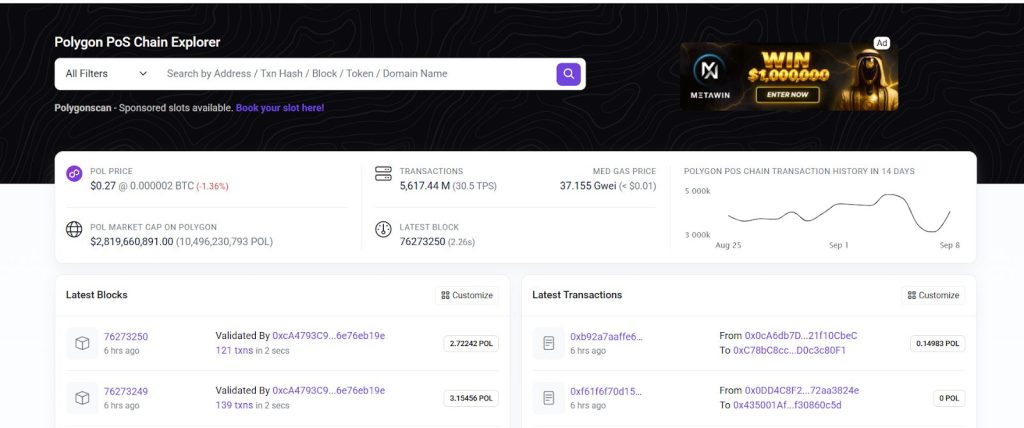The Polygon PoS Network is experiencing a network finality delay caused by a node bug impacting Bor and Erigon nodes, with transactions taking 10–15 minutes to completion, according to an official incident report from the Polygon Foundation.
UPDATE: Temporary Delay in Finality
While the chain continues to run and blocks and checkpoints are produced, there is currently a 10-15 minute delay in finality due to a milestone issue.
We have identified a fix, and it is being rolled out to all validators and service…— Polygon Foundation (@0xPolygonFdn) September 10, 2025
The disruption, which started early Wednesday, has affected several Remote Procedure Call (RPC) services and caused applications built on the network to experience accessibility problems.
The Polygon team has confirmed that the bug is hindering node advancement for specific configurations.
Polygon PoS Network Bug Forces Third-party Protocols to Suspend All Polygon Transactions
Nevertheless, restarting affected nodes has successfully resolved the problem for some participants.
“We observe that restarting nodes has resolved the issues for numerous validators and RPC providers,” Polygon stated.
Currently, Polygon’s block explorer Polygonscan indicates that the network’s most recent block was generated over 6 hours ago.

However, in its most recent update, the company directed users to a Bor Mainnet displaying block updates with more than 102 active nodes.
The Polygon token POL (formerly MATIC) has reacted negatively to the downtime incident, currently trading at $0.2669 with a $2.8 billion market cap.
POL has declined 3.42% today, extending its year-to-date drop to 30.3%.
Data from DeFiLlama similarly shows that Polygon has lost most of its Total Value Locked (TVL) from the 2021 bull run.
After reaching a peak of $9.432 billion in June 2021, Polygon’s TVL has decreased to just $1.2 billion.
Several protocols have already paused Polygon transactions to prevent finality and reversal complications.
TokenPocket, a widely used multichain stablecoin wallet, posted on X to inform its users:
“We have observed that the most recent block on Polygon was produced over an hour ago. Currently, all on-chain transactions on Polygon are temporarily halted.“
Transaction finality means a trade cannot be reversed once the network confirms it as final.
New blocks keep coming every few seconds, but transactions can still be undone until they reach this final state.
The delays force exchanges and DeFi apps to wait longer before processing deposits or trades, since they need absolute certainty before moving user funds.
Two Layer-2 Networks Down: Is This Ethereum’s Scaling Crisis?
Meanwhile, developers are highlighting another network outage that affected the Linea network earlier today, questioning whether there’s any connection with the Polygon disruption since both are Ethereum Layer-2 scaling solutions.
Linea and Polygon block chain experienced downtime at about the same time
Could it be related?
Linea is now back online and producing blocks.
Polygon, however, remains down, nearly 2 hours and counting https://t.co/csD5mwddVK pic.twitter.com/Lr5gK3Arta— Sifu (@0xCeefu) September 10, 2025
However, Linea has already restored block production following a temporary outage affecting its mainnet sequencer that caused a 67-minute downtime.
Although Linea has not revealed the root cause of the outage, it announced that it identified the issue and deployed a fix, according to the network’s status page.
A Polymarket trader also expressed frustration regarding the transaction finality bug affecting Polygon.
He noted that while the Polygon PoS network has minimal users, it shouldn’t be experiencing critical issues like this when it hosts the largest prediction market in the crypto sector.
Polymarket is a decentralized platform that happens to be one of the premier products built on Polygon, enabling users to wager on global event outcomes, spanning science to sports, and culture to crypto.
The latest Polygon network incident follows a period of recent network disruptions.
In July, Polygon implemented a Heimdall upgrade designed to improve stability and validator coordination.
According to Polygon Foundation CEO Sandeep Nailwal, the upgrade dubbed Heimdall v2 was intended to reduce transaction finality to just five seconds while addressing longstanding technical debt from Polygon’s early development period (2018-2019).
Product Announcement
~5 Second Finality + Modernized Core Infra on Polygon PoS
Polygon PoS engineers have completed deployment of Heimdall v2 to mainnet, upgrading the consensus layer, decreasing large reorgs, and bringing transaction finality to ~5 seconds (down from 1-2… pic.twitter.com/nsI6dgu2ci— Sandeep | CEO, Polygon Foundation (※,※) (@sandeepnailwal) July 11, 2025
Polygon’s network, however experienced a separate, hour-long disruption weeks after the complex hard fork.
The Heimdall development follows Polygon’s Bhilai hardfork on July 1, 2025, which significantly increased throughput to 1,000 transactions per second (TPS) and integrated Ethereum’s Pectra EIPs for enhanced account abstraction.
The post Polygon PoS Network Faces 10-15 Minute Transaction Delays Due to Node Bug appeared first on Cryptonews.












